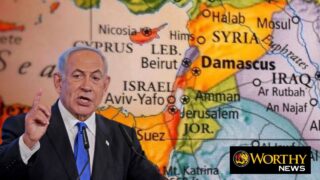
by Emmitt Barry, with reporting from Worthy News Jerusalem Bureau Staff
(Worthy News) – Several Arab nations and the Arab League issued sharp condemnations on Wednesday after Israeli Prime Minister Benjamin Netanyahu appeared to endorse the vision of a “Greater Israel” during a televised interview.
The controversy arose from Netanyahu’s appearance on i24 News with former right-wing Knesset Member Sharon Gal. Gal asked whether the war since Oct. 7 had led to a spiritual “strengthening” for the prime minister. Netanyahu replied:
“When you reach these kinds of tests, you always ask the question, ‘why’, ‘what are you doing here’… we’re here on a generational mission. There are generations of Jews who dreamed of coming here, and generations who will follow us. So if you’re asking me whether I feel I’m on a historic and spiritual mission, the answer is yes.”
Gal then presented Netanyahu with a necklace depicting the “promised land” — a map whose borders exceeded modern Israel, appearing to encompass parts of Egypt, Jordan, Syria, and Iraq. “Do you feel a connection to this vision?” Gal asked. “Very much,” Netanyahu responded, linking his generation’s duty to the founding generation’s mission of creating the Jewish state.
While Netanyahu’s remarks appeared to reference the biblical “promised land” and the task of safeguarding Israel rather than a concrete plan for territorial expansion, they triggered swift condemnation across the Arab world.
The Palestinian Authority called the comments “a provocation and a dangerous escalation that threatens the security and stability of the region,” accusing Israel of pursuing “expansionist colonial policies.” Saudi Arabia’s foreign ministry rejected “settlement and expansionist projects” and warned of threats to global peace. Jordan’s Foreign Ministry labeled the statements a “dangerous and provocative escalation,” while Egypt sought clarification from Israel over the implications for regional stability. The Arab League described the remarks as a “blatant violation of the sovereignty of Arab states” and evidence of “colonial delusions.”
The concept of “Greater Israel” has roots in early Zionist maps from the British Mandate era, which included present-day Israel, Judea and Samaria (West Bank), Gaza, the Golan Heights, and territory now forming Jordan. Since the 1967 Six-Day War, the term has been used primarily by Religious Zionists and some far-right groups advocating Jewish settlement throughout Judea and Samaria, with fringe factions extending the idea to include areas of neighboring Arab states.
The backlash comes as Finance Minister Bezalel Smotrich announced plans to approve over 3,000 housing units in the contentious E1 corridor between Jerusalem and Ma’ale Adumim. Critics say the project — frozen for years due to international opposition — would bisect the West Bank and block the creation of a contiguous Palestinian state. Smotrich, who oversees West Bank civilian affairs, said the plan “buries the idea of a Palestinian state” and advances a “de facto sovereignty” agenda.
Reporting contributed by Worthy News staff and wire services.
Copyright 1999-2026 Worthy News. This article was originally published on Worthy News and was reproduced with permission.
Latest News from Worthy News
The Trump administration has finalized a sweeping reciprocal trade agreement with Taiwan, confirming a 15 percent U.S. tariff rate on Taiwanese imports while securing broad new market access and purchase commitments for American goods.
Democrats are applauding White House border czar Tom Homan’s Thursday announcement that immigration enforcement operation in Minnesota will end next week.
Democrats in the U.S. Senate tanked the Homeland Security full-year funding bill in a last-ditch vote Thursday, all but guaranteeing a partial government shutdown starting Saturday.
Mourners in a remote Canadian town grappled Thursday with the aftermath of one of the country’s deadliest school shootings in decades, as families, survivors and leaders reacted to the tragedy that left eight victims — most of them children — dead, along with the 18-year-old suspect.
A gunman who opened fire at a school in southern Thailand’s Hat Yai city on Wednesday wounded a teacher and a student before being detained, authorities said, in a rare attack that sent students and staff into panic.
The Republican-led House of Representatives has passed the Safeguard American Voter Eligibility (SAVE) America Act, advancing legislation that would require proof of citizenship to register to vote and photo identification at the polls. The bill now heads to the Senate, where its future remains uncertain amid strong Democratic opposition.
Israel’s Ministry of Defense announced on Wednesday that its advanced David’s Sling air and missile defense system has completed a series of complex modernized tests, a development officials say bolsters the country’s defensive posture as tensions with Iran escalate and the United States prepares military options that could include direct strikes.







